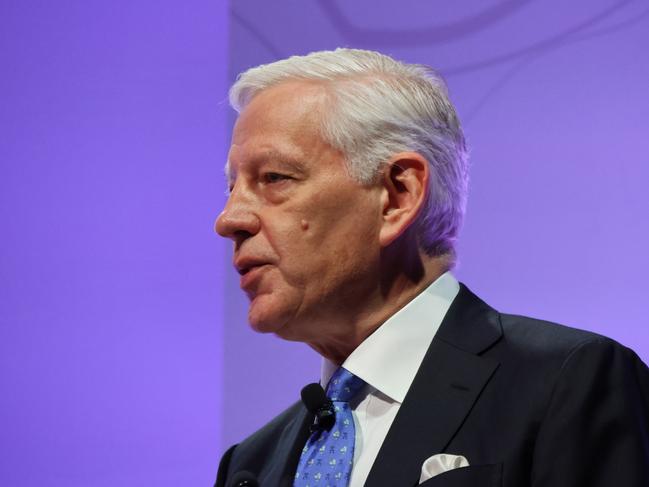Rio Tinto survives dual listing vote, but thorny issue may not be settled forever
A push to bring an end to Rio Tinto’s dual listing has been knocked back by the mining giant’s shareholders, but the level of support for the motion means it could be revisited one day.

Business
Don't miss out on the headlines from Business. Followed categories will be added to My News.
Rio Tinto shareholders have rejected a push by London-based hedge fund Palliser Capital to abandon its UK listing, after the mining giant’s chairman Dominic Barton mounted a convincing defence of the board’s opposition.
Activist fund Palliser moved a motion that should it secure the support of 75 per cent of shareholders, it would require Rio to conduct a transparent review of unification and make the findings public so shareholders could make an informed decision.
Just shy of 20 per cent of Rio’s shareholders backed the motion, according to disclosures made to the Australian Securities Exchange on Thursday. The result tempers the immediate pressure on Rio’s board to act, although the minority who supported a review means the issue remains live.
Palliser acknowledged the result, but said the board had been given a clear message from influential shareholders and it will continue to press the issue.
“Having shone a glaring light on their governance failings and unsubstantiated analysis, we expect to build on our work with a board that is more willing to collaborate and listen, so that, together, we can achieve our shared goal of improving long-term shareholder value,” the UK hedge fund said in a statement.
Palliser argued unification would free up capital for shareholders and subsequently unlock a better valuation, with chief investment officer James Smith insisting Rio had underperformed rival BHP by some 8 per cent.
The push was backed by the pension fund for Californian public servants, CalPERS, which owns about $US210m ($328.2m) in Rio shares, and another Californian fund, CalSTRS.
But Mr Barton insisted that while the company was agnostic about where it was listed, independent experts had shown there would be a significant financial toll should it revert to a single listing. Rio splits its listing between the London and Australian bourses.
“All of this work showed that unification would be value destructive for the group and its shareholders,” Mr Barton told shareholders.
“I also want to be clear that we were open-minded about all routes that maximise value for you, our shareholders, and that’s the lens through which we assess this topic. I think we have had seven meetings with Palliser.”

Mr Barton also rejected suggestions Rio had underperformed BHP.
“I would like to correct the assertion that has been made that Rio Tinto has underperformed our direct peer since the announced collapse of their DLC. In fact, since that announcement, after adjusting for the demerger of their petroleum business, Rio Tinto has outperformed this peer by 7 per cent from a market capitalisation performance perspective, despite headwinds from our commodity mix, over that same period,” Mr Barton told shareholders.
Palliser disputes the tax bill estimate and argues the dual listing has created a value drag of about $US50bn from an inability to use equity in acquisitions over the past 30 years, and that unification could release up to $US25bn.
The Rio board has been unanimous in recommending shareholders vote against the proposal and has described Palliser’s assertions of the alleged $US50bn of value loss as “unfounded and misleading”.
Rio also highlighted the value of the franking credits on its balance sheet to Australian self-funded retirees at the meeting.
There are also concerns within the Rio board that a transparent review will expose confidential tax arrangements across its global operations.
Mr Barton had pushed back aggressively on unification. He last month took aim at proxy adviser Institutional Shareholder Services after it backed the Palliser motion. In a letter to investors, he accused ISS of dismissing the material unification costs and significantly overstating the benefits.
He said ISS accepted incremental wastage of $US15bn of franking credits over the next decade as a price for unification, and told investors he had “significant concern” with some of the advisory firm’s conclusions.
Glass Lewis also supported the Palliser motion, while rival proxy advisers ACSI and Ownership Matters advised voting against it.
Mr Smith, Palliser’s founder, had earlier urged shareholders vote in favour of its sponsored motion.
“It’s too confidential, they say, it’s too sensitive and it wouldn’t be good for shareholders to see this information and this is something we struggle to credit,” Mr Smith said via telephone from London.
Mr Smith worked at Elliott Management when it led a successful campaign for the unification of BHP’s listings in the UK and Australia.
While the motion was overwhelmingly rejected, some influential groups insist the level of support is likely large enough to force Rio to undertake the review. Palliser was hoping for at least 20 per cent support for its motion, The Australian reported on Monday. It never appeared likely to succeed needing a 75 per cent majority of London and ASX shareholders to endorse it, which would have required huge support at the London meeting given that 77 per cent of shareholders own the London-traded stock.
Goldman Sachs has warned ditching the dual-listed structure may cost the miner between $US7bn and $US15bn and cruel its ability to continue paying fully franked dividends to Australian shareholders.
More Coverage
Originally published as Rio Tinto survives dual listing vote, but thorny issue may not be settled forever





